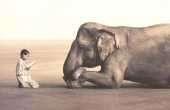seriouscourt
Court is a drama teacher and avid storyteller, currently working towards her MA in Writing. She has a head full of unwritten essays and a fondness for synonyms.
Contributor I
- Lurker
- Pssst
- Sharp-Eyed Citizen
- ?
- Articles
2 - Featured
2 - Comments
11
- Ext. Comments
11 - Processed
7 - Revisions
6
- Topics
5 - Topics Taken
0 - Notes
4
- Topics Proc.
52 - Topics Rev.
25
- Points
645 - Rank
191 - Score
349
Latest Articles
Latest Topics
Authors & Authentic PerspectivesAn increasingly important conversation in the book industry is that of diverse representation, both in the characters and stories we promote, and in the authors whose work we publish. Central to this discussion is the question: who has the right to write? Can a neurotypical author write from an autistic perspective? Can a white American write about the experience of growing up Chinese-Indian? A key part of this discussion also comes down to authenticity: the effort and care put into representations of particular cultural groups and their experiences. Take, for example, Mark Haddon's 'The Curious Incident of the Dog in the Night-Time' (2003) and John Boyne's 'The Boy in the Striped Pyjamas' (2006). Both of these texts received great acclaim in relation to their representation of Asperger's/autism and the holocaust respectively, to the point that both have been included in school curriculums and other education programs since their publications. However, both authors have publicly stated that they did minimal research into the experiences they wrote about, choosing to focus more on the narrative at hand than the accuracy of their work. Does this diminish the texts' cultural influence/importance? What responsibility do authors have to ensure authenticity (and accuracy) in their works, especially when they're not part of the community they're writing about?
|
Pennames, Pseudonyms and (Mis)representations of GenderMany well-known female authors have published their works under male-presenting or gender-neutral pennames; Mary Ann Evans (George Eliot), The Brontë Sisters, J.K. Rowling. In the male-dominated world of literature, it was a way to have their works heard. In more recent times, however, we are seeing an increase in men publishing under neutral or female-presenting names. Todd Ritter, who published "Final Girls" under the name Riley Sager, Dean Koontz who published as Deanna Dwyer, Ian Blair as Emma Blair, and so on. There have been arguments that these are to create a neutral approach to the story, or to simply distance the author's personal life from their work. However, many people have expressed dissatisfaction with this, saying that men's voices are already dominant, and it's not right for men to take up more space by publishing under a female pseudonym. This topic asks: is it alright for an author to disguise or misrepresent their gender in their name? Does that thought apply only to men writing under female names? And if it is determined to be acceptable, does that effect similar discussions around ethnicity and heritage?
|
Assassin’s Creed and Feminine FreedomAs the Assassin’s Creed franchise continues to grow and explore more of the world, so too has its options for players expanded… Sort of. For example, Kassandra has a male lover and a child in the ‘canon’ of Odyssey (Legacy of the First Blade), no matter if the player turns down male lovers and plays her as a solely sapphic character. In Valhalla, there are certain times during the game where a female Eivor will be presented as male. In earlier games, the female playable characters received even less recognition; Evie is only playable for ~30% of Syndicate, and Elise was initially designed to be a playable character in Unity, but that was scrapped by Paris Editorial. Why do the Assassins Creed games have such a hard time allowing the player to play as females, and to then not have their gender be a limitation or a core aspect of their narrative? The company needs to have a linear narrative, thus the character has to do certain things so the desired story can exist. However, particularly when it comes to female characters, this often contradicts the player's desired narrative choices for their character.
|
The Battle for Artistic Freedom: Fanfiction and CopyrightThe Tolkien Estate recently changed their copyright, stating that under no circumstances may a person “create materials which refer to the characters, stories, places, events or other elements contained in any of Tolkien’s work”. Close on the heels of this announcement came the importing of The Library of Moria fanfiction archive into the Archive of Our Own network; an archive with a legal team that works to protect the content hosted there. This isn’t the first time that an author or estate has laid down the law regarding the creation of fan content under the arguments of copyright and protecting the integrity of the original work. Authors like Anne McCaffrey and Anne Rice have well-remembered conflicts revolving around fanfiction of their books – but what is the future of fan works in a world of cease-and-desists, DMCAs and fiercely-protected copyright claims? The majority of fanfiction and other fan work is created and consumed for free out of a passion for the source material. Is it an estate or author’s right to ban the creation of any and all fan content in the name of ‘integrity’?
|
The Draw of Elf-Dwarf Romances in Tolkien AdaptationsIn all JRR Tolkien’s lore, the Elves and Dwarves are diametrically opposed races. However, in the filmed adaptations of his works, we see an emphasis on the developments their positive relationships.
|
Latest Comments
| Continuity and Connectivity in Comic Book Movies | |
Lots of varied examples, very nice! | Men Written by Women: Dreamboats or Brutes? |
Interesting! As a fan of Star Wars who never delved into any of the books, I’m now really keen to give them a go – thank you for opening my eyes to them! | Star Wars Publishing Is Taking An Exciting Plunge Into The Unknown |
Great article – a thorough and well presented insight on a man whose work I’m now motivated to become far more familiar with! | Demystifying Franz Kafka |
Such great and varied examples all the way throughout this article! It’s interesting how many of these qualities we come to subconsciously value as readers/viewers/consumers without really understanding *why* they make the works so good. Really well articulated, Michel! | The Pillars of Outstanding Stories |
Fantastic article! I think your observation that “the heroes of contemporary fantasy are defined by their relationship with the supernatural; they are heroes because of the supernatural presence in their lives, not always because of some unique inner quality” is particularly interesting. Seeing the ways contemporary authors and readers interpret and respond to different qualities in heroes (and the different definitions of what makes a ‘good’ story hero) is always fascinating. | Fantasy Writing and Classical Antiquity |
I didn’t grow up with Filmore but this article has definitely convinced me to give it a watch. Well researched and well articulated! | Celebrating, Analyzing, and Resurrecting Fillmore! |
A very interesting read! It’s interesting to compare the ways in which women expressed themselves between in the 18th C and now – despite a lot of progress, we still face similar issues when it comes to social expectations. It would have been nice to have a little more variation in the subject of the contemporary poems, and a stronger link back to the initial subjects towards the end of the piece, but overall it was an insightful comparison of poetics. | Poetry and Feminism in the Eighteenth Century |


Really interesting article! I think the connectivity in comic books are their greatest pitfall – as you said, trying to follow storylines from one piece of media but having to connect it to one or more other storylines from other parts is complex and makes it easy to lose engagement or momentum. I think the MCU pulled this off well – enough easter eggs for longtime fans to feel spoken-to, with enough context and revitalising that new fans could also engage easily.
The issue of the MCU’s ‘natural end’ with Endgame is also interesting – as an MCU fan my interest dipped significantly with the introduction of the multiverse. I’m just not someone who loves crossovers that much, but I do think that the multiverse was a very clever way to keep things feeling (at least moderately) fresh. However, I wonder if, like comic books, it’s going to get harder and harder for new fans to engage with the timeline and connectivity as a whole as more and more movies are added to the collection.